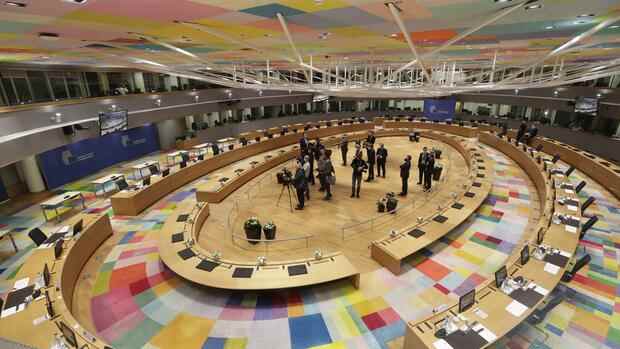There were some delays in the negotiations between the 27 EU countries on the sanctions.
(Photo: Reuters)
The 27 EU countries have launched the fifth major package of sanctions against Russia. On Thursday evening, the permanent representatives of the member states approved the EU Commission’s proposals for an import ban on coal, wood and vodka as well as numerous other punitive measures. This was confirmed by several diplomats from the German Press Agency in Brussels.
In order for the sanctions to come into force, the necessary legal acts now only have to be adopted in writing and published in the EU Official Journal. However, these steps are considered a formality and should be completed this Friday.
Poland prevented the negotiations from being concluded earlier. According to diplomats, the country initially did not want to accept that the transition period for the import ban on Russian coal should be four months at the request of countries like Germany – and not three months as originally planned by the commission.
Also controversial was the demand from countries such as Greece and Malta not to formulate the regulations for the planned port closure quite as strictly as originally planned by the EU Commission.
Top jobs of the day
Find the best jobs now and
be notified by email.
The reason for the new severe sanctions against Russia is in particular the discovery of war crimes in the vicinity of the capital Kyiv after the withdrawal of Russian troops. Above all, the images of corpses, some of them tied up, on the streets of the Butscha suburb cause horror. Ukraine blames Russian troops for atrocities against residents. Moscow denies this and speaks of a staging, but without presenting any evidence.
Loss of revenue of around four billion euros due to the coal embargo
The new punitive measures are intended to increase the pressure on Russia – above all by imposing high economic costs on the country. According to the EU Commission, the coal embargo alone could mean a loss of revenue of around four billion euros per year.
Also part of the sanctions package is a complete ban on transactions at the expense of four important Russian banks, including the second largest Russian bank VTB. Russian ships and ships operated by Russia are also to be banned from entering EU ports. There should only be exceptions for the delivery of food, humanitarian aid and energy.
In order to further weaken the Russian economy, there are said to be further restrictions on trade with Russia with a volume of around 10 billion euros. According to the Commission, these include quantum computers and means of transport. Products such as wood, cement and seafood worth 5.5 billion euros should also no longer be imported into the EU. In addition, Russian companies will no longer be allowed to participate in public tenders in EU countries.
In addition, other people associated with Russian President Vladimir Putin are to be included on the sanctions list. This means that they would no longer be allowed to enter the EU and any assets in the EU would be frozen. Among those affected are the two daughters of Russian President Vladimir Putin.
According to the US government, which also sanctions Putin’s daughters, Katerina Tikhonova is a technical executive whose work supports the Russian government and defense industry. Her sister Maria Vladimirovna Vorontsova leads state-funded programs that are funded by the Kremlin with billions of dollars for genetic research and personally monitored by Putin. Little is known about Putin’s daughters. Tikhonova was born in 1986, her sister in 1985.
More: All developments on the Ukraine war in the live blog
